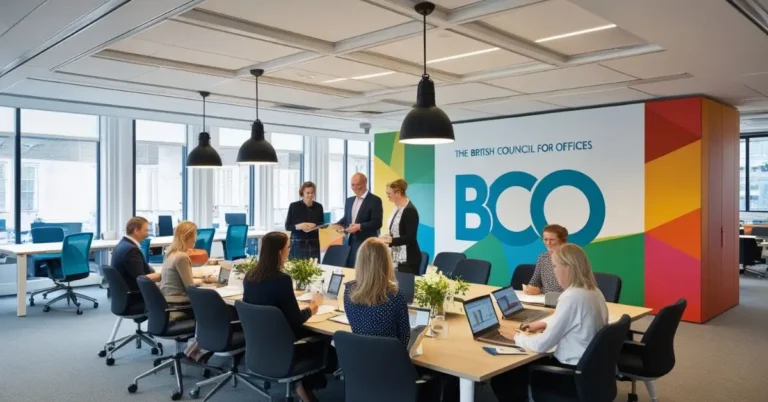In an increasingly mobile world, the British Council for Offices (BCO) is a key organization committed to developing the office industry. Since its founding, the BCO has grown to be a crucial resource for professionals in the field, providing insights, stimulating dialogue, and promoting innovation in office design and administration. The function, operations, and effects of the BCO on the office industry are examined in this article.
History and Mission of the BCO
The British Council for Offices was established in 1990 as a response to the growing need for a unified voice in the office sector. Its primary mission is to advocate for excellence in office space design and management, ensuring that workplaces are conducive to productivity, health, and well-being. The BCO serves as a platform for members to share knowledge, debate trends, and influence the future of office environments.
Key Activities and Contributions
- Research and Publications
One of the core functions of the BCO is its commitment to research and the dissemination of knowledge. The organization publishes a range of reports, white papers, and case studies that provide valuable insights into various aspects of office design and management. These publications cover topics such as workplace trends, sustainability, and the impact of technology on office environments. The BCO’s research not only informs best practices but also helps shape industry standards.
- Events and Networking
The BCO organizes numerous events throughout the year, including conferences, seminars, and workshops. These events bring together professionals from across the office sector, including architects, designers, developers, and facility managers. They provide a platform for networking, knowledge exchange, and discussion on emerging trends and challenges. The BCO’s events are known for their high-quality content and relevance to current industry issues.
- Awards and Recognition
To celebrate excellence in the office sector, the BCO hosts annual awards that recognize outstanding achievements in office design, management, and innovation. The BCO Awards are highly regarded and serve as a benchmark for quality and innovation in the industry. Winning an award is a mark of distinction and demonstrates a commitment to excellence in creating effective and inspiring work environments.
- Guidance and Best Practices
The BCO provides members with access to a wealth of resources, including guidelines and best practice frameworks. These resources cover a range of topics, from space planning and design to workplace health and safety. By offering practical advice and standards, the BCO helps members navigate the complexities of office management and design, ensuring that they can deliver high-quality workspaces.
- Advocacy and Influence
As a leading authority in the office sector, the BCO plays a significant role in advocating for policies and practices that benefit the industry. The organization engages with policymakers, regulators, and other stakeholders to influence legislation and standards related to office environments. Through its advocacy efforts, the BCO aims to create a supportive environment for the office sector and promote positive change.
The Impact of the BCO on the Office Sector
The British Council for Offices has had a profound impact on the office sector, shaping how workspaces are designed, managed, and perceived. Some of the key areas where the BCO has made a difference include:
- Driving Innovation
The BCO’s focus on research and best practices has driven innovation in office design. By promoting cutting-edge solutions and new technologies, the BCO has helped to transform traditional office spaces into dynamic and flexible work environments. This innovation is crucial in adapting to changing work patterns and meeting the evolving needs of the modern workforce.
- Promoting Sustainability
Sustainability is a core concern for the BCO, and the organization has been at the forefront of promoting environmentally responsible practices in office design and management. The BCO’s research and guidelines emphasize the importance of energy efficiency, sustainable materials, and green building certifications. By championing sustainability, the BCO contributes to reducing the environmental impact of office spaces.
- Enhancing Workplace Well-being
The BCO recognizes the link between office environments and employee well-being. Through its research and publications, the organization highlights the importance of creating healthy and supportive workspaces. This includes considerations such as air quality, natural light, and ergonomic design. By advocating for these factors, the BCO helps to create work environments that enhance employee health and productivity.
- Fostering Collaboration and Networking
The BCO’s events and networking opportunities provide a valuable platform for professionals in the office sector to connect and collaborate. This fosters a sense of community and encourages the sharing of ideas and experiences. The relationships built through BCO events can lead to new partnerships, innovations, and advancements in the industry.
- Setting Industry Standards
Through its guidelines, research, and awards, the BCO has established itself as a key authority in setting industry standards. The organization’s work helps to define what constitutes excellence in office design and management. By setting high standards, the BCO drives continuous improvement and ensures that the office sector remains at the forefront of best practices.
Future Directions
As the office sector continues to evolve, the British Council for Offices is likely to play an increasingly important role. The rise of remote work, technological advancements, and shifting workplace trends present both challenges and opportunities for the industry. The BCO will need to continue its focus on research and innovation to address these changes and support its members in adapting to new realities.
Future initiatives may include exploring the impact of hybrid work models, advancing sustainable design practices, and leveraging emerging technologies to enhance office environments. The BCO’s ability to anticipate and respond to these developments will be crucial in shaping the future of workspaces.
Conclusion
The British Council for Offices (BCO) is a vital organization that has significantly influenced the office sector through its research, publications, events, and advocacy. By promoting excellence in office design and management, the BCO helps to create work environments that are productive, sustainable, and conducive to employee well-being. As the industry continues to evolve, the BCO’s role in driving innovation and setting standards will remain essential in shaping the future of office spaces.
Through its ongoing efforts, the BCO not only supports its members but also contributes to the broader goal of creating effective and inspiring workplaces. As we look to the future, the BCO’s commitment to excellence will continue to guide and influence the office sector, ensuring that it meets the needs of a dynamic and changing world.

